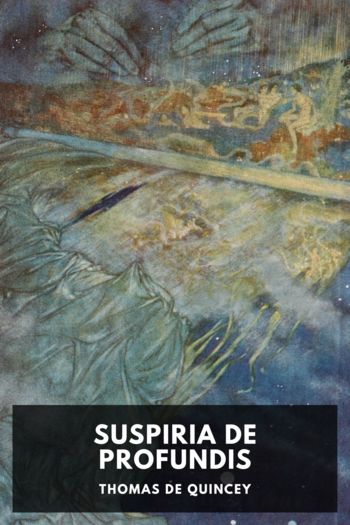Suspiria de Profundis, Thomas De Quincey [cool books to read .txt] 📗

- Author: Thomas De Quincey
Book online «Suspiria de Profundis, Thomas De Quincey [cool books to read .txt] 📗». Author Thomas De Quincey
One only person in this world there is who could tonight have been a supporting friend to our young sufferer; and that is her dear, loving twin-sister, that for eighteen years read and wrote, thought and sang, slept and breathed, with the dividing-door open forever between their bedrooms, and never once a separation between their hearts. But she is in a far distant land. Who else is there at her call? Except God, nobody. Her aunt had somewhat sternly admonished her, though still with a relenting in her eye as she glanced aside at the expression in her niece’s face, that she must “call pride to her assistance.” Ay, true; but pride, though a strong ally in public, is apt in private to turn as treacherous as the worst of those against whom she is invoked. How could it be dreamed, by a person of sense, that a brilliant young man, of merits various and eminent in spite of his baseness, to whom for nearly two years this young woman had given her whole confiding love, might be dismissed from a heart like hers on the earliest summons of pride, simply because she herself had been dismissed from his, or seemed to have been dismissed, on a summons of mercenary calculation? Look! now that she is relieved from the weight of an unconfidential presence, she has sat for two hours with her head buried in her hands. At last she rises to look for something. A thought has struck her; and, taking a little golden key which hangs by a chain within her bosom, she searches for something locked up amongst her few jewels. What is it? It is a Bible exquisitely illuminated, with a letter attached by some pretty silken artifice to the blank leaves at the end. This letter is a beautiful record, wisely and pathetically composed, of maternal anxiety still burning strong in death, and yearning, when all objects beside were fast fading from her eyes, after one parting act of communion with the twin darlings of her heart. Both were thirteen years old, within a week or two, as on the night before her death they sat weeping by the bedside of their mother, and hanging on her lips, now for farewell whispers and now for farewell kisses. They both knew that, as her strength had permitted during the latter month of her life, she had thrown the last anguish of love in her beseeching heart into a letter of counsel to themselves. Through this, of which each sister had a copy, she trusted long to converse with her orphans. And the last promise which she had entreated on this evening from both was that in either of two contingencies they would review her counsels, and the passages to which she pointed their attention in the Scriptures: namely, first, in the event of any calamity that, for one sister or for both, should overspread their paths with total darkness; and, secondly, in the event of life flowing in too profound a stream of prosperity, so as to threaten them with an alienation of interest from all spiritual objects. She had not concealed that, of these two extreme cases, she would prefer for her own children the first. And now had that case arrived, indeed, which she in spirit had desired to meet. Nine years ago, just as the silvery voice of a dial in the dying lady’s bedroom was striking nine, upon a summer evening, had the last visual ray streamed from her seeking eyes upon her orphan twins; after which, throughout the night, she had slept away into heaven. Now again had come a summer evening memorable for unhappiness; now again the daughter thought of those dying lights of love which streamed at sunset from, the closing eyes of her mother; again, and just as she went back in thought to this image, the same silvery voice of the dial sounded nine o’clock. Again she remembered her mother’s dying request; again her own tear-hallowed promises; and, with her heart in her mother’s grave, she now rose to fulfil it. Here, then, when this solemn recurrence to a testamentary counsel has ceased to be a mere office of duty towards the departed, having taken the shape of a consolation for herself, let us pause.
Now, fair companion in this exploring voyage of inquest into hidden scenes or forgotten scenes of human life, perhaps it might be instructive to direct our glasses upon the false, perfidious lover. It might. But do not let us do so. We might like him better, or pity him more, than either of us would desire. His name and memory have long since dropped out of everybody’s thoughts. Of prosperity, and (what is more important) of internal peace, he is reputed to have had no gleam from the moment when he betrayed his faith, and in one day threw away the jewel of good conscience, and “a pearl richer than all his tribe.” But, however that may be, it is certain that, finally, he became a wreck; and of any hopeless wreck it is painful to talk—much more so when through him others also became wrecks.
Shall we, then, after an interval of nearly two years has passed over the young lady in the boudoir, look in again upon her? You hesitate, fair friend; and I myself hesitate. For, in fact, she also has become a wreck; and it would grieve us





Comments (0)